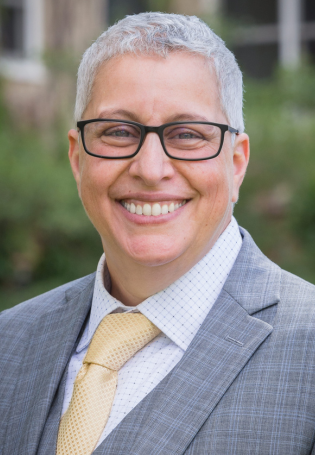Developing Leadership Capacity for the Change We Wish to See
L. Lynn Vidler, Dean of the College of Letters, Arts & Sciences at the University of Colorado Colorado Springs, calls for a shift in how higher education approaches leadership.

During last summer’s ACLS Leadership Institute for a New Academy (LINA) Summer Institute in Tarrytown, NY, our cohort laid out ideas for initiatives designed to create a more inclusive, creative, and pluralistic academy, like creating more inclusive promotion and tenure criteria, diversifying the faculty, and promoting public scholarship, among others. However, without the leadership skills to drive organizational change, these projects have eluded higher education. There’s a reason why we call the pace of change in academia “glacial.”
This challenge is a structural design flaw in the academic system. During the PhD, we teach students to focus on research so they will finish their dissertation. For those who become tenure-track faculty members, we then counsel them to focus on research (again) so that they will get tenure. By the time faculty members achieve tenure, they have never been taught to lead and may have, even if indirectly, been taught to disdain leadership. At the same time, faculty governance requires university leaders to be tenured (full professors for deans and provosts). And yet we wonder why there are so few competent leaders among them?
Leadership is not defined by native charisma or by technical competence. It does not mean that someone is in a position of authority. Leadership is something one does, and also happens to be a scholarly discipline that can be studied, analyzed, practiced and, yes, applied. After spending the first twelve years of my career as a civilian faculty member at West Point, I began to wonder why academia seemed to leave leadership to chance. Academia puts systemic obstacles in its own path, unintentionally but actively, limiting the development of badly needed leadership capacity.
For several years now, I have developed and offered workshops for new chairs as well as stand-alone workshops for all chairs on topics such as preparing for and engaging in difficult conversations, giving and receiving feedback, distinguishing between technical and adaptive leadership challenges, clarifying one’s values, and identifying opportunities for leadership within one’s scope of influence. This year, I collaborated with HR colleagues Angela Bender, Chief of HR, and Jerilyn Taylor, Director of HR Operations, on the development of a campus-wide leadership development strategy at the University of Colorado Colorado Springs. Our program is designed to promote the growth of fundamental leadership skills and an inclusive, collaborative, and cross-functional culture for the entire campus community.
Leadership capacity is the sine qua non of the survival of higher education. […] To succeed, we need everyone to lead, whether from a position of authority or not. L. Lynn Vidler
We continue to expand our efforts in this area. We’ve begun with two cohort programs, one for academic chairs and directors and another for staff first-line managers. Additionally, HR created and implemented optional online training in leadership and management concepts for all employees. Furthermore, knowing that all academic leaders were once graduate students, my colleague Jennifer Poe, Director of the Center for Student Research, and I now run workshops introducing graduate students to the foundational concepts of leadership. Even if they never become higher-ed administrators, all will benefit from reflecting on their purpose and values. All will benefit from learning how to manage conflict. All will benefit from learning how to engage others to work together to solve difficult problems. We teach graduate students to research, and sometimes we teach them to teach, but we rarely teach them to lead. They do not need to ever be in an academic administrative job to engage others to make progress on important challenges. That said, once graduate students embrace, rather than disdain, the value of leadership skills, more may find themselves less reluctant to chair their department once it is their time to do so. We are submitting the program to the Higher Learning Commission next month for approval as our campus’s Higher Learning Commission Quality Initiative.
Leadership capacity is the sine qua non of the survival of higher education. Without it, we will not be able to adapt to the changing higher ed, political, scholarly, and cultural landscapes. Without it, we will struggle to implement creative solutions to the important challenges that higher education faces. To succeed, we need everyone to lead, whether from a position of authority or not.
– L. Lynn Vidler
A community for sharing and uplifting the work of creating more just, humane, and innovative colleges and universities

